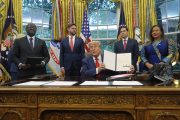
A temporary travel ban on people from six terrorist-spawning nations took effect Thursday evening — with a few asterisks. It was the result of a 9-0 Monday Supreme Court ruling in which the justices knocked down lower-court stays on the ban, the first version of which was created via executive order by President Trump on January 27.
This is Trump’s, and America’s, first travel-ban victory after a bruising five-month battle in which usurpative judges trampled the Constitution and unprecedentedly challenged executive power. It shouldn’t be the last: The SCOTUS will hear arguments on the full case in October.
Monday’s ruling, however, was only a partial victory for the administration (and sanity). “The 90-day ban on visitors from Iran, Libya, Somalia, Sudan, Syria, and Yemen, and a 120-day ban on refugees, will allow exceptions for people with ‘close family relationships’ in the United States,” as Yahoo! News reports.
The site continued, “According to guidelines issued by the State Department, people with ‘close family relationships’ would be exempt from the ban. It defined that to include parents, spouses, children, sons- and daughters-in-law, siblings and step- and half-siblings.” Of course, with the sizes of many families in the given nations, one could wonder just how much “anchor migration” this could mean.
Yahoo! tells us in addition that people “with formal relationships with a U.S. entity — who have for instance been offered a job or been accepted to study or lecture at a university — will also qualify for visas during the ban.”
These provisions inspired a dissenting opinion that, writes the Washington Post, “said the travel ban should have been allowed to take effect in full…. Justice Clarence Thomas, joined by Justices Samuel Alito Jr. and Neil Gorsuch, wrote that the decision would ‘prove unworkable.’”
“‘Today’s compromise will burden executive officials with the task of deciding — on peril of contempt — whether individuals from the six affected nations who wish to enter the United States have a sufficient connection to a person or entity in this country,’ Thomas wrote.”
And, unsurprisingly, there already is a legal challenge to Trump’s stance on the ban: The state of Hawaii, siding with an imam, is asking a federal judge to declare it in violation of the SCOTUS opinion.
Tragically, all this ignores that it’s the prerogative of the chief executive, not the courts, to make such immigration determinations. In fact, the 1952 Immigration and Nationality Act the Trump administration cited in justifying its ban is very clear. As section 212(f) states, “Whenever the President finds that the entry of any aliens or of any class of aliens into the United States would be detrimental to the interests of the United States, he may by proclamation, and for such period as he shall deem necessary, suspend the entry of all aliens or any class of aliens as immigrants or nonimmigrants, or impose on the entry of aliens any restrictions he may deem to be appropriate.”
Note that the lower courts originally staying Trump’s ban did not rule the above unconstitutional; they merely rendered a spun opinion with no basis in law.
In reality, the lower-courts’ actions, challenging the executive branch’s power to deny foreigners visas, were unprecedented. As the Post also informs, “Leon Fresco, deputy assistant attorney general for the Office of Immigration Litigation in President Barack Obama’s Justice Department, said that in some ways the court’s ruling restores long precedent.”
“‘It has never been the case for 100 years that someone can simply sue us for not getting a visa,’ he said.”
For sure, this executive power was recognized prior to 1952. For example, “The day after the Japanese attack on Pearl Harbor, [President Franklin] Roosevelt suspended naturalization proceedings for Italian, German, and Japanese immigrants, required them to register, restricted their mobility, and prohibited them from owning items that might be used for sabotage, such as cameras and shortwave radios,” writes GilderLehrman.org.
Later, in 1979-80, President Jimmy Carter severely restricted visa issuance to Iranians and deported thousands of them.
Despite this, many leftists are hell bent on scuttling policy designed to safeguard the home front, advancing specious arguments and false notions in the process.
For example, some claim there has never been a terrorist attack by anyone from one of the six ban-affected nations. Not only is this untrue, it ignores foiled plots and the fact that such individuals have launched attacks overseas; this is relevant because it reflects the overall problem. Would we continue letting possibly contaminated beef into our nation, even though it had killed people abroad, simply because no one in the United States had died yet?
Do we have to wait until 3000 more Americans are slaughtered in a terrorist incident before taking action?
Just as significantly, however, the media have consistently mischaracterized the reason for the ban. They will point to how terrorist-spawning Saudi Arabia isn’t included (and I support an actual “Muslim ban”), ignoring that Syria and the other five nations made the list not because the people are worse, but because the governments barely function.
Being disorganized, not having comprehensive, Western-style databases on their citizens — and being places where bribes can get one official government documents stating he’s whoever he wants to be — it’s impossible to reliably vet immigrants from such nations.
Then there’s the “discrimination” argument. It ignores that all immigration policy involves discrimination, meaning, to choose some from among many (since 1965, the policy has meant 85 percent of our newcomers hail from the Third World). The only way to avoid this would be to have entirely open borders.
Yet the most ridiculous argument is that, somehow, targeting Muslims (explicitly or implicitly) is a violation of the First Amendment’s freedom of religion guarantee; this is the application of U.S. constitutional protections to foreigners overseas.
Now, consider: Under the First Amendment, the government can’t restrict citizens’ religious exercise. It also, however, can’t restrict or limit such their freedom of speech; if someone proclaims himself a Nazi, for instance, the state has no recourse.
The point? If the First Amendment is to be applied to foreigners overseas, and if this means we can’t discriminate against them in immigration, how could we prohibit Nazis, Marxists, or anyone else from entering our nation? Under this “thinking,” 1903’s Anarchist Exclusion Act would have had to be ruled unconstitutional. Hey, “Give me your terrorists, your persecutors, your muddled miscreants yearning to squelch freedom.”
The larger issue here is that the courts have become a de-facto oligarchy ruling over the people. It’s time for Congress to clip their wings and for all of us to consider Thomas Jefferson’s warning: that the principle of judicial supremacy makes our Constitution a suicide pact.




